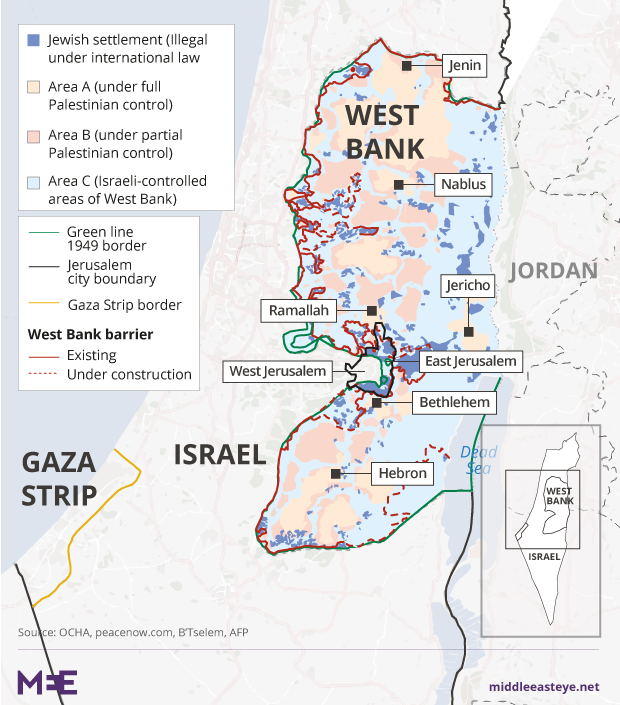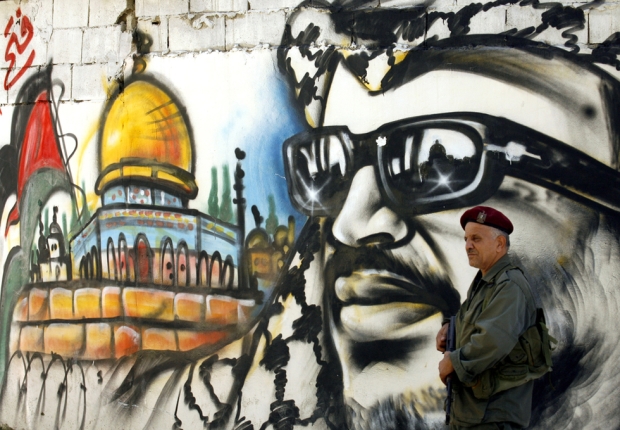EXCLUSIVE: Trump’s 'ultimate deal' seen as ultimatum to Palestinians
Crown prince offered Mahmoud Abbas more cash for new state as Saudi Arabia pushes for Israeli support against Iran, say sources

US President Donald Trump before a meeting with Palestinian Authority President Mahmoud Abbas at United Nations General Assembly in September 2017 in New York (AFP)

Wednesday 22 November 2017
JERUSALEM/WASHINGTON - A US team is in the process of finalising President Donald Trump’s "ultimate deal" for peace between Palestinians and Israel, a Western diplomat and Palestinian officials have told Middle East Eye.
The diplomat, who spoke on condition of anonymity because he was not authorised to discuss the issue with the media, said that the deal will include:
- The establishment of a Palestinian state, whose borders will include the Gaza Strip as well as Areas A, B and parts of Area C in the West Bank (see map below)
- Donor countries to provide $10bn to establish the state and its infrastructure including an airport, a sea port in Gaza, housing, agriculture, industrial areas and new cities
- The status of Jerusalem and the issue of returning refugees to be postponed until later negotiations
- Final negotiations to include regional peace talks between Israel and Arab countries, led by Saudi Arabia
The diplomat said that Jared Kushner, Trump’s special adviser and head of his team for the peace process, visited Saudi Arabia recently and briefed Saudi Crown Prince Mohammed bin Salman, who is also known as MBS, about the plan.
Kushner also asked the Saudis to help persuade Palestinian President Mahmoud Abbas to accept the plan, which will be officially presented in early 2018.

The diplomat, who is very close to the US team, said bin Salman had met with Abbas in early November to brief him on the proposal. The crown prince asked the Palestinian president to accept the plan and be positive about it.
“MBS is very enthusiastic about the plan,” the diplomat said, “and he is eager to see a peace deal between the Palestinians and Israel first, then between Israel and the Arab countries, as a first step in forming a coalition between Saudi Arabia and Israel to counter the Iranian threat.”
Saudi need for support against Iran
The diplomat said that bin Salman told Kushner he is willing to invest large amounts of capital in the deal, and would give the Palestinian leadership the necessary incentives for a positive response.
Palestinian officials told MEE that Abbas met with bin Salman during his recent visit to Riyadh, which began on 8 November. There, he offered to increase Saudi financial support to the Palestinian Authority almost three-fold from $7.5m a month to $20m.
'This is Netanyahu’s plan and he sold it the US team and they are trying to sell it to the Palestinians and Arabs'- Palestinian official
Bin Salman told Abbas that the Iranian threat to Arab countries is serious, sources close to the talks said, and that Saudi was in serious need of support from the United States and Israel to face its "existential conflict" with Tehran. “We cannot have Israel on our side before solving the Palestinian-Israel conflict," the source reported the crown prince as saying.
One Palestinian official said: “President Abbas believes the plan could be okay only if we add to it the words '1967 borders'. We are willing to give Israel time if they are willing to give us land.
"We told them, if the plan states clearly that the 'ultimate deal' is to have Palestinian statehood [based] on the 1967 borders with a slight land swap, [then] we will accept the first stage of it, which [is ] establishing a state with provisional borders.”
The official, who is close to the talks, said the only Palestinian concerns were that Israel will make the provisional deal final.
Another Palestinian official said Abbas believes the plan, which was drafted by Kushner and Middle East envoy Jason Greenblatt, initially originated from Israeli Prime Minister Benjamin Netanyahu. “This is Netanyahu’s plan and he sold it the US team and they are trying to sell it to the Palestinians and Arabs,” the source said.
Palestinian DC office shut down
The official added that the Palestinians are now expecting more pressure from Washington and Arab capitals.
“The US is waving sanctions against the Palestinians if they reject the plan, like shutting down the PLO mission office in Washington DC and stopping the financial aid to the Palestinian Authority,” the source said.
That threat came to pass this week as the US shut down the office of the Palestinian representative in Washington and the Palestinians in turn froze all meetings with the US, officials said on Tuesday.
READ MORE ►
"What is the use of holding any meetings with them when they close our office? Our meetings begin from our office, and the arrangements are there," Palestinian Foreign Minister Riyad al-Malki told AFP.
The Palestinian official said that in 2000, Egyptian President Hosni Mubarak and then Saudi Crown Prince Abdullah told PLO leader Yasser Arafat: "We accept only what the Palestinians accept."
“At the Camp David Talks in 2000, the Arabs supported late leader Yasser Arafat in facing the US pressure. But now, no one is standing alongside us.
"But now the Saudi king is drowning in the conflict with Iran in Yemen, Lebanon, Syria and Iraq and the Egyptian president is drowning in Sinai."
Relations between Saudi and Israel have eased during the past few months. Recent reports have suggested that a Saudi prince travelled to Tel Aviv for a secret meeting with senior Israeli officials.
On 16 November, Gadi Eizenkot, Israel's chief of general staff, said that the country was ready to share “intelligence information” with Saudi Arabia and that both countries had a common interest in opposing Iran.
'Empty words'
But many Palestinians say they would reject any Saudi-led peace deal which compromised on the right of return of Palestinian refugees and sought to "normalise" Arab relations with Israel.
 A Palestinian security officer stands by a mural of Yasser Arafat in Ain el-Helweh (AFP)
A Palestinian security officer stands by a mural of Yasser Arafat in Ain el-Helweh (AFP)
"This will never be accepted by any Palestinian, inside Palestine, outside Palestine, anywhere," Major General Sobhi Abu Arab, the Palestinian national security chief in the Ain el-Helweh refugee camp in Sidon, Lebanon, told MEE.
READ MORE ►
"This is not a new idea. It is brought up every so often and Abu Mazen [Abbas] would never agree to it."
"These are empty words that have been used for decades."
Zafer al-Khateeb, a Palestinian activist inside Ain el-Helweh, said that Israel was seeking to use the opportunity with Saudi Arabia to "break the taboo on Arab normalisation with Israel".
"They know the right of return cannot be removed. That is not to say there isn’t something being cooked. There is certainly work being done, but until now it is unclear and there is no reality on the ground," he said.
This article is available in French on Middle East Eye French edition.
